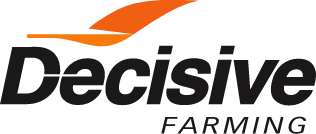Brad McDougald jokes that farmers can always find something to complain about. “Doesn’t matter whether it’s too warm, too dry, too cold,” McDougald says with a chuckle.
This year was a dry season in Drumheller, Alta., where his 2,500-acre farm produced about 40 per cent of its regular yield of wheat, canola, peas, lentils and barley. But for all the elements outside a farmer’s control, McDougald says such a yield was better than expected for such dry conditions. He credits managing the health of the soil on his farm as crucial to this year’s harvest and the future of his fields. “You see it in these dry years, as we still have a healthy plant,” he says. “The soil is constant and that is the most critical to take care of.”
To keep his fields healthy, McDougald has worked with Garth Donald, Decisive Farming by TELUS Agriculture’s manager of agronomy, for 17 years – even before Donald co-founded Canadian farmtech startup Decisive Farming in 2011. “I was just about hooked the first year,” McDougald says, after using Decisive Farming’s high-tech and data solutions, acquired by TELUS in 2019, to optimize the quality and yield of the harvest on his farm.
This exploration of the technology company’s move into agriculture was similar to its evolution into healthcare, both underscoring TELUS’ commitment to social capitalism and using technology to solve some of the world’s biggest challenges.
Decisive Farming combines satellite data to measure crop density and agricultural data from historic yields, along with soil sampling to help farmers manage their farm’s soil health and optimize the quality and yield of their crops.
Before Decisive Farming, McDougald says he would order a single type of fertilizer that was broadly formulated to rebalance the nutrients of his soil across all his fields. But even within a single field, the soil’s nutritional needs can vary. “The field is not flat, it’s rolling,” he explains. “There are different types of soil on top of the hill versus down in the bottom of a little dip,” which affect its nutritional contents and potential for crop output.
Fertilizer Canada lays out the “Four Rs” of contemporary nutrient stewardship: using the right source at the right rate, the right time and the right place. Decisive Farming uses the principles of variable rate nutrition to create custom fertilizer formulas, offering different levels of nitrogen, phosphorus, potassium and sulphur, all based on the needs of the different segments of a farmer’s field, like “a digitized prescription,” Donald says. Then, using the soil samples and topographic data to spot the gaps in a field’s crop density, Decisive Farming shows farmers how much fertilizer to apply to optimize their harvest.
While in the tractor applying fertilizer McDougald says he can see the zones on his computer screen where he would traditionally speed up or slow down to apply more or less fertilizer. Where more nutrients are needed on his field, he can see where to apply more fertilizer, maximizing the harvest potential of that spot. In nutrient-rich pockets, he can apply less fertilizer, saving on money and reducing emissions. “It’s improved our farm overall,” McDougald says. “Decisive Farming helps you to maximize the potential of each zone in your field without over fertilizing and wasting product.”
Decisive Farming offered its variable rate fertility services to 1.5 million acres of farmland , and its full range services have been used on nearly 6 million acres acrossWestern Canada. “Every year we are seeing a growth within the variable rate fertilizer side of our business, because farmers are looking at how to manage costs,” as well as improve their farm’s sustainability, Donald says.
Farmers are facing financial and environmental pressures, as fertilizer prices, while dropping from their 2022 highs after Russia’s invasion of Ukraine, are still higher than before. Donald says fertilizing an acre of canola costs $150 to $180. “When you’re spending that much money per acre, you want to be using it to its greatest potential. So variable rate fertilizing is a way to optimize the dollars invested in the ground,” he says. With greater pressures from the federal government to reduce nitrogen emissions related to fertilizer use, Donald says Decisive Farming provides “a better product, a healthier product, an environmentally healthy product, all while reducing our environmental load into the system.”
Alongside the need to cut costs while being conscious of environmental factors, McDougald says “we need to take care of the soil for the future.” McDougald, a fourth-generation western farmer, wants to ensure his children can keep farming sustainably.
“This spring, my son asked me: ‘What’s going to happen if things change? Do you think we’re going to be able to change farming to keep up with the environment?’’ McDougald told him that, like the weather, there is constant change and unpredictability. But, like farmers across Canada, his family has always found a way to adapt.
“It’s changed a lot from the way my dad farmed, to the way my grandfather farmed, to my time,” he said. “When my son and my daughters are farming and they’re showing it to their kids, I’m sure they will have different things from what we’re doing.” But some goals will remain constant. “It’ll all be for the same purpose: to maximize the yield and take care of that soil.”
This article was produced as part of a Soil Health series with sponsor content stories also appearing in the Western Producer.


